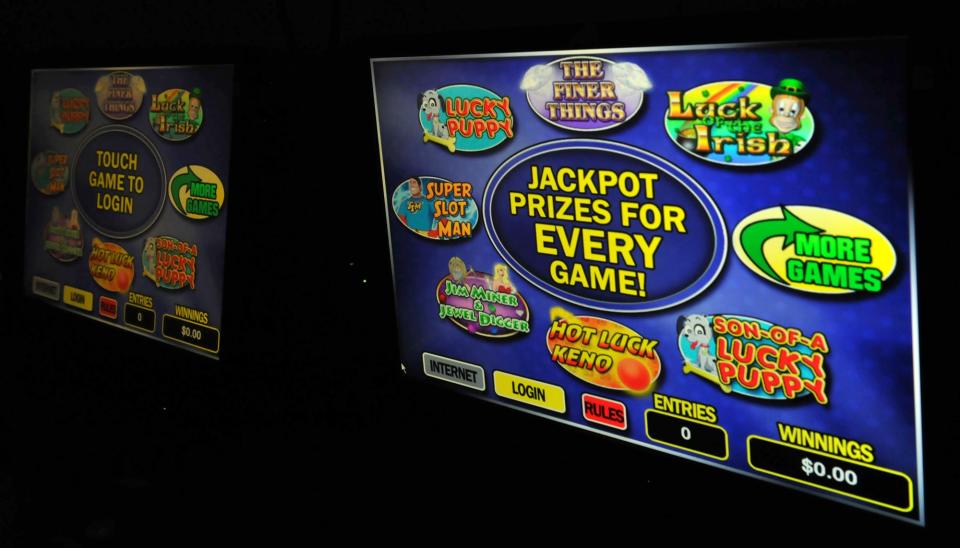Legalized gambling in NC could pump money to Fayetteville State and Fayetteville Tech
The North Carolina legislature is considering two bills to vastly expand legal gambling in North Carolina.
Tax revenues from gaming would be spent on higher education — including Fayetteville State University and Fayetteville Technical Community College — and used to underwrite college and youth sports.
One bill would legalize video poker-type machines. It was discussed in a state House committee on Tuesday.

The second gambling bill would legalize betting on professional, college and amateur sports, and betting on horse racing. The bill passed the House on March 29, and the state Senate Commerce and Insurance Committee approved it on Wednesday.
The lawmakers supporting these bills say gambling is already happening despite being illegal, so the state should regulate it and get tax revenue.
Opponents at the committee meetings on Tuesday and Wednesday said legalized gambling will be harmful for society.
Tens of thousands of North Carolinians will become addicted to gambling if it is legalized, said John Rustin of the North Carolina Family Policy Council.
“Problem and pathological gambling manifests itself in increases in theft, embezzlement, job loss, personal bankruptcy, substance abuse, domestic violence, child abuse, divorce, and even suicide,” he said.
Video gambling for HBCUs and community college tuition
The state has been battling video poker, video sweepstakes and similar video gambling since at least 2000 with various laws and court battles.
Yet gambling is popular and continues unregulated, with law enforcement unable or unwilling to devote limited resources to stop it, said Republican state Rep. Harry Warren of Rowan County. He is the sponsor of House Bill 512, which would legalize video machine gambling.
“But by restricting, regulating and reducing the supply, we can eliminate sweepstakes parlors and the seedy aspects of unregulated gambling, replacing it with a limited supply of gaming entertainment that fulfills the public demand in a safer, controlled environment, and safer conditions,” Warren said.
Warren estimated there are 50,000 to 100,000 illegal video gambling machines in North Carolina. He predicted the numbers would drop to 18,000 to 34,000 legal machines.
Warren’s bill says:
The machines must have state-issued permits. Any machine without a permit would be illegal and could be seized by law enforcement.
The machines could not dispense money but could dispense credits that can be redeemed for cash. Winners with prizes worth $600 or more would collect the money from the North Carolina State Lottery Commission.
The machines would be connected to a central monitoring system operated by the Lottery Commission.
After the prizes are issued, the state would collect 32% of the machines’ revenues.
That money would be used for administration and law enforcement. It also would be used for college education. Specifically:
$2 million per year for each of the state’s five public historically Black universities, including Fayetteville State University to improve graduation rates and student success. Also, $2 million annually for the University of North Carolina at Pembroke, which is of American Indian heritage.
$10 million in annual grants for private HBCUs.
A new Community College Scholarship Loan Program. Students could get loans to pay for their tuition. If they graduate within six years, the loans would be forgiven.
Betting on horse racing and sports
House Bill 347 would legalize gambling on professional, college and amateur sports, and horse racing. This includes pari-mutuel betting (a form of betting in which people pool their money and bet on which horses finish first, second and third in a race).
“This is just recognizing that this practice exists,” Republican state Sen. Tim Moffitt of Henderson County said at the committee meeting on Wednesday. “It has existed since the beginning of time. It’s increasing with access to smartphones and technology. And in order for us to actually regulate it and manage it in our state — this is what this bill does.”
Taxes levied on the gambling businesses the gambling would be spent as follows, according to a legislative document:
Eleven of North Carolina’s public universities, including Fayetteville State, UNC-Pembroke, UNC-Wilmington, UNC-Asheville and UNC-Charlotte, would get rising amounts of money annually to support college athletics. It’s estimated at $1.4 million by fiscal year 2027-28.
The state Division of Parks and Recreation would get $1 million annually to give grants to counties for youth sports development.
The N.C. Outdoor Heritage Advisory Council would get $1 million annually for grants “to assist sports teams with travel expenses and to attract non-professional sporting events.”
The N.C. Major Events, Games and Attractions Fund would get rising amounts annually “to encourage and promote the attraction of major events.” It’s estimated at $16.2 million by fiscal year 2027-28.
The program would set aside $2 million annually for gambling addiction and treatment programs.
Senior North Carolina reporter Paul Woolverton can be reached at 910-261-4710 and pwoolverton@gannett.com.
This article originally appeared on The Fayetteville Observer: NC could legalize gambling, send revenues to colleges and youth sports

